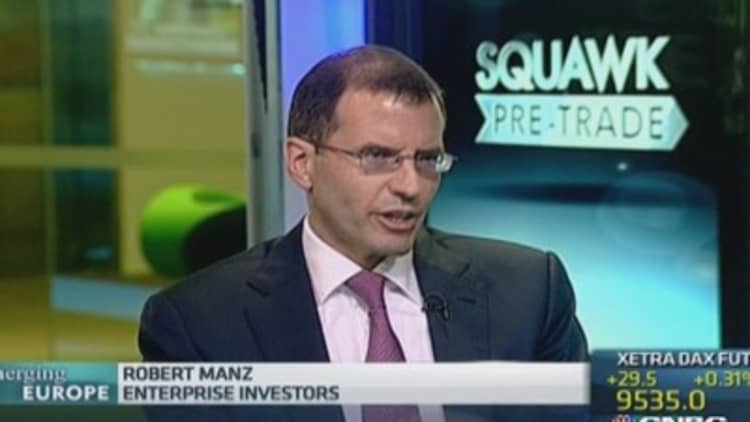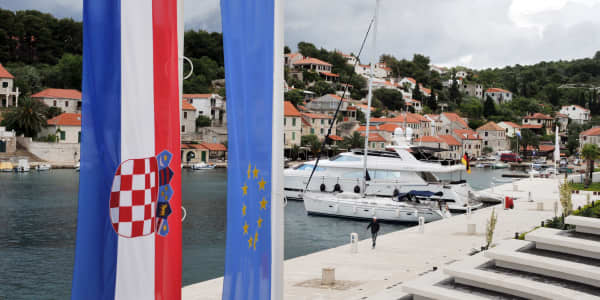Weakness and sanctions in Russia, the conflict in Ukraine together with the euro zone's sluggish economic growth have had a "chilling" effect on Central Eastern Europe.
Analysts have warned that trade within and outside of Central and Eastern Europe (CEE) have been hit, falling slightly in CEE ex-Russia in the third quarter when compared with a year earlier, having risen around 6 percent on the year in the previous quarter, according to Oxford Economics.
But despite what Oxford Economics call a "creeping chill" spreading across eastern Europe, some of the region's largest economies have managed to keep stable as monetary policy remains accommodative and foreign direct investment and tourism improves.
Read MoreWealthy Chinese flock to Prague
CNBC takes the economic pulse of emerging Europe:
Poland 'resilient'
Food producers across CEE in particular felt the sting of the crisis in Ukraine, after Russian authorities retaliated against Western sanctions imposed on Moscow by introducing a sweeping ban on imports of fruit and vegetable from the European Union.
Poland, the world's biggest apple producer, was hit particularly hard. It exports 438 million euros ($545 million) worth of the fruit in 2013, of which 56 percent went to Russia, according to country's Ministry of Agriculture.
Nevertheless, credit rating agency Moody's said Poland's economy had shown "resilience in times of stress" and the ratings firm said it expected to see continued recovery in the region. The country's gross domestic product grew by 2.0 percent in 2102, dipping to 1.6 percent last year, according to EU statistics service Eurostat.
"While Moody's expects the contribution of exports to weaken following Russia's ban on EU food imports, and investment momentum to marginally lose steam in (the second half of) 2014, it notes that domestic group's consumption will likely outweigh these factors," Marco Zaninelli, analyst at Moody's said in the annual Poland Credit Analysis report released on Friday.
Hungarian bank woes
Banks operating in Hungary have had a tough year. The government, led by Prime Minister Viktor Orban, imposed Europe's highest bank levy back in 2010 in response to poor regulation and the huge volume of foreign currency loans issued before the financial crisis.
Lenders have been hit with a series of penalties since then -- most recently in July when the government passed a law forcing banks to pay out compensation for the "unfair" conditions of these foreign currency loans.
Read MoreEastern Europe battles 'Wild West' image
Share prices in lenders with large Hungarian loan books have been under pressure and look set for further struggles as Orban pledges to hold the banks "to account".
Austria's Raiffeisen Bank, one of the largest lenders in the region, has seen its shares fall around 35 percent so far this year. The bank made a 202 million euro net loss in the third quarter, mainly due to the 205 million euro charge imposed by the Hungarian government.

Shares in fellow Austrian bank Erste Group is down around 15 percent over the same period.
Ratings agency Fitch affirmed its junk rating on Hungary's senior unsecured foreign bonds at BB+ on Friday, but said the country's outlook was "stable", even as it struggles with high public and external debt.
"A series of new laws will lead to a conversion of foreign exchange loans to households into (Hungarian currency) forint loans and marked reduction in interest rates paid to banks. The move will strengthen households' balance sheet but further weaken the already fragile banking sector," Fitch analysts led by Arnaud Louis said.
Investors flock to Czech Republic
In the neighboring Czech Republic, the economy is expanding quickly, as investments boost the country.
Gross domestic product climbed 2.4 percent when compared with the previous year and grew 0.4 percent from the previous quarter, according to Czech Statistical Office data released Friday.
Both figures beat earlier flash estimates of 2.3 percent and 0.3 percent growth, respectively, with investment being "the most important growth factor for the second consecutive quarter," the data agency said.
Consumer confidence in the country also turned positive for the first time since March 2007, with the consumer confidence index rising to 1.7 percent in November, up from -2 the previous month, separate data from the Statistics Office showed.
The Czech capital, Prague, is the most visited capital in Central Europe, according to commercial retailer Cushman and Wakefield.
"Tourists' expenses in Prague play the vital part of revenues for retail stores in the city since the number of foreign overnights is more than 10x higher than number of inhabitants, far greater than in any other CE city," analysts at the group said.
- By CNBC's Jenny Cosgrave





